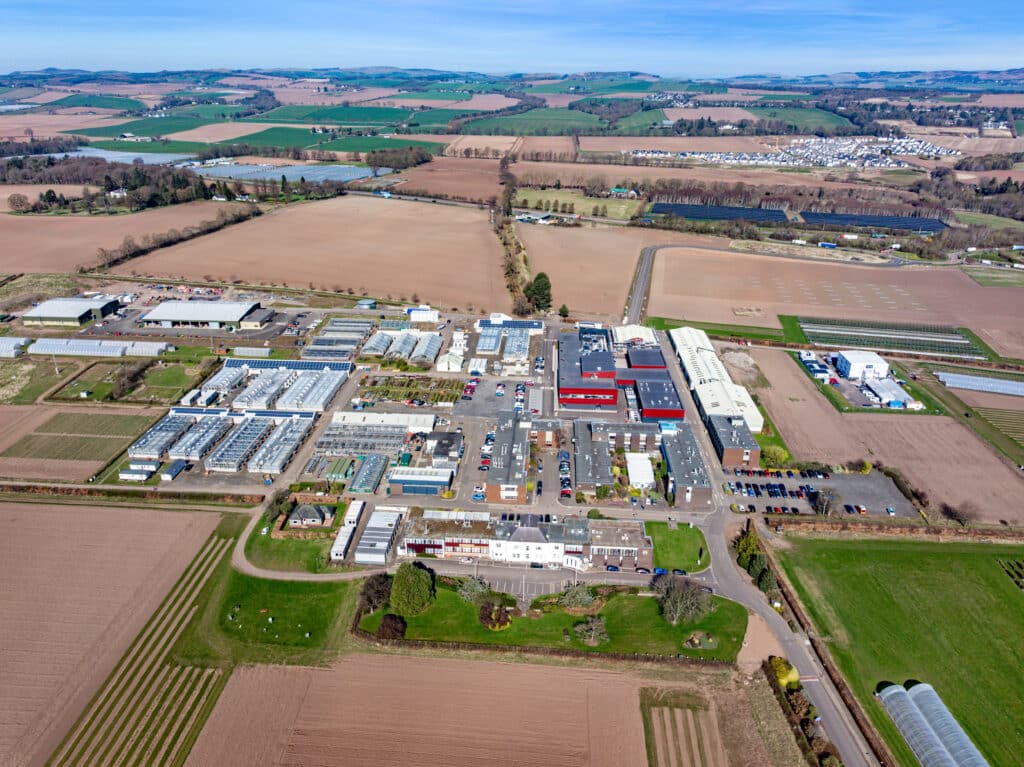The James Hutton Institute has been recognised for its outstanding economic contribution and scientific excellence. Two independent evaluations have confirmed the growing real-world value of the Hutton’s globally respected research, which supports the sustainable management of land, crops and natural resources.
A new economic impact report by BiGGAR Economics reveals that in 2023/24, every £1 of funding the Hutton received from the Scottish Government generated over £15 in value for the UK economy — £9 of which stayed in Scotland. This affirms the Hutton’s role as a cornerstone of Scotland’s research and economic infrastructure.
The Institute’s work added £61.8 million in Gross Value Added (GVA) to regions near its main campuses — £40 million in the Dundee city region and £22 million in the Aberdeen city region. It also supported 2,575 jobs across the UK, including 1,525 in Scotland and 740 within the Aberdeen and Dundee areas, according to a press release.
Driving Value in Food, Drink and Innovation
In 2024 alone, the Hutton’s research contributed £221.3 million to the UK’s food and drink sector, supporting approximately 1,185 jobs. Since 2016, the value of commercial research contracts secured by the Institute has increased from under £1 million to £2.6 million, even amid Brexit-related funding challenges.
The development of a robust innovation ecosystem — fostered by major investments through the Tay Cities Region Deal — has been instrumental. Key initiatives include the International Barley Hub and the Advanced Plant Growth Centre, both hosted on Hutton campuses.
Tackling Climate Change
The Hutton is playing a vital role in helping society adapt to and mitigate the effects of climate change. From shaping resilient agricultural practices and preserving biodiversity to restoring habitats and reducing agriculture’s carbon footprint, the Institute’s work aligns with Scottish Government priorities around sustainability, climate resilience and net-zero targets. Initiatives like the HydroGlen green hydrogen farm exemplify how the Hutton is providing practical, scalable solutions for rural adaptation.
Scientific Excellence with Global Reach
This economic impact stems from the Institute’s interdisciplinary research, which combines natural and social sciences. A recent independent review by international experts found all five Hutton departments to be “excellent,” “outstanding,” or “highly original.” The review also praised the Institute’s strategic focus, deep institutional experience, and valuable scientific assets — including genetic resource collections and advanced research facilities built over decades.
“It’s clear that investment in our excellent science makes an incredible contribution to the Scottish, UK and global economies and shows that science is a safe and productive investment,” Professor Colin Campbell, CEO at the Hutton said. “While the economic impact is large it is most visible the tip of the impact we have in terms of environmental social and economic benefits.
“We are grateful to our funders — particularly the Scottish and UK governments – who trust in our science and who are rewarded with the types of figures we are reporting today. We know we are in a race against time to address the far-reaching impacts of the climate and nature crises on our economic, environmental and societal sustainability and to protect our food, energy and water security. Hutton science shows the value of understanding our world better providing solutions that people need and want. Increased investment in science remains critical to our shared long-term goals.”
Looking Ahead
The economic impact report underlines the need for sustained investment in research infrastructure, skills development, AI, data capabilities, and open science. The Institute is now pursuing infrastructure funding to establish new innovation clusters, including a National Potato Innovation Centre near Dundee and an International Land Use Study Centre at its Craigiebuckler campus.
Case studies from the report including for including barley, potatoes, soft fruit, climate and biodiversity and carbon capture can be found on the website.
Sectoral-specific values:
- Barley: an additional 4.9 million additional tonnes of barley was produced in Europe in 2023 due to yield improvements as a result of genetic research, and the Hutton’s contribution to this has a derived value of around £112 million.
- New crop varieties: Hutton researchers work in partnership with commercial seed developers to produce varieties that offer improved yield and meet specific performance needs. The total UK market value of Hutton varieties in 2024 was almost £38m, £93.4 million internationally, with the main varieties being raspberries, blackberries and blackcurrants.
- Whisky: Scotch whisky generated £7.1 billion in gross value added (GVA) for the UK (including £5.3 billion in Scotland) in 2022. Hutton research into barley genetics and water resource management is estimated to have helped safeguard almost £270 million in whisky sales in 2024 (£97.8 million in GVA) and around 310 jobs supported in Scotland, £136.6 million in GVA and 435 jobs supported across the UK (see case study).
- Ribena: Around 90% of the blackcurrants grown in the UK now end up in Ribena and around three quarters of these are grown from Hutton varieties. In 2023, around £50 million of UK Ribena sales were sustained by Hutton variety blackcurrants and the Hutton’s contribution is estimated at £34.0 million in GVA to the UK economy, supporting around 375 jobs (see case study).
- Seed potato: At least 50% of the economic value of this sector is attributable to the Hutton. This amounts to a contribution of £13.1 million GVA/year to the Scottish economy and around 240 jobs.
The external science reviews were carried out by Information and Computational Science (ICS), Ecological Sciences (ES), Social, Economic and Geographical Sciences (SEGS), Environmental and Biochemical Sciences (EBS), and Cell and Molecular Sciences (CMS).
